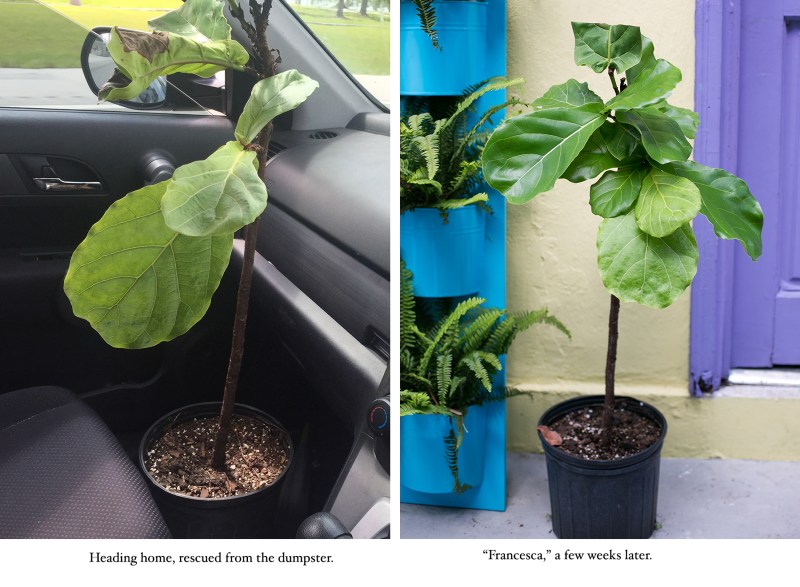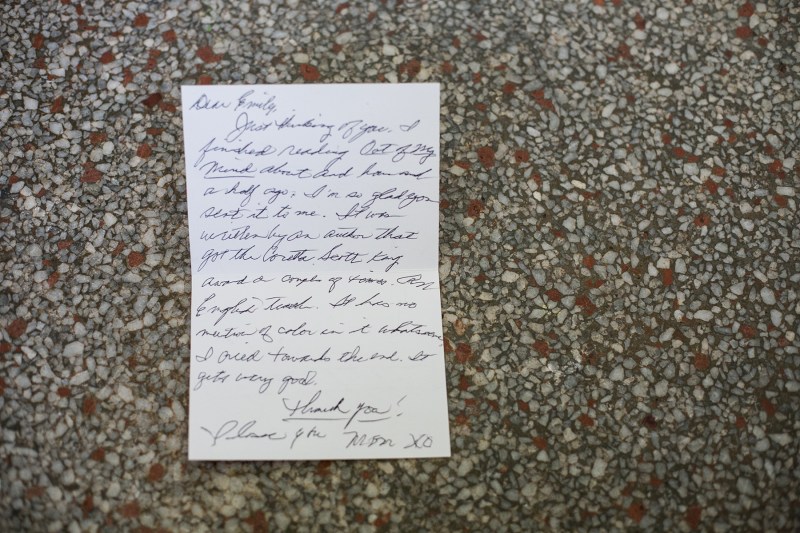
“Can you go feed Google?” I asked my six-year-old daughter, Maddie, this morning.


“Can you go feed Google?” I asked my six-year-old daughter, Maddie, this morning.

If you had caught a glimpse of my mother on December 6, you might have seen her naked, outside her home, holding a knife and clearly very, very unwell. Someone did see her – presumably one of her kind neighbors, and called the police. They came, and she was taken into custody, in handcuffs, and admitted into the psychiatric hospital where she stayed for the next 48 days over the Christmas and New Year holidays. I wanted to highlight this bizarre scene, not because it’s sensational (it is), or because it’s funny (it’s not), or because we need more depictions of this kind of “crazy” version of mental illness. (we don’t.)
I wanted to paint that picture in your mind first, so you can contrast it against my mom’s very lucid, reasonable and pleasant conversation with me, here. Sometimes it is impossible for us to imagine that someone like her – in the worst moments of a psychotic break – could ever be so normal, or ever was normal, sane, clear.. whatever you want to call it. And the flip side to that contrast, is that even hearing the clarity in her voice and enjoying this wonderful conversation we had, there will almost certainly be, dark days ahead. The threadbare unpredictability wedged between sanity and psychosis is the world she lives in, and the life my brother and I continue to struggle figure out.
Here’s our conversation. (I transcribed it because at times she is a bit difficult to understand and the audio quality is not wonderful.)
Transcription of a telephone conversation between my mother and I, Feb. 6, 2017.
me: Okay mom, you’re on speaker.
her: I’m blessed that I don’t have to worry about what I eat. I think I’m lucky.

My mom has schizophrenia.
But sometimes I’ve been jealous of other daughters whose moms have cancer.

It was about 9:30 p.m.


Tonight, my mom tried to give mouth-to-mouth to a dead kitten.
It was only a few days old.
She called me sobbing. I knew this was coming.
I hadn’t allowed myself to hope the kitten would make it.
The rest of the litter had already died. The mom, a feral cat that lives in and out of her house, had abandoned her babies. Who knows why.
This situation was very upsetting and heartbreaking for my mom, whose chore has been to gather up dead kittens and put them in the trash this week.
The pragmatist in me felt anger first. “Ugh, MOM, stop feeding these wild cats! They only cause problems!”
I wanted to scream at her, but not because I’m mad about the cats.
I was mad about this moment. The one that came tonight, where she cried her raspy sobs into the other side of the phone and I stood there helpless, letting her grieve and offering my calming words.
“It’s okay mom. You tried hard. Nobody could have done much better, okay?”
“Okay,” she cried. “At least he purred a few times. That means he felt some happiness.”
More sobs.
“Yes, that’s right, mom. Do you want to stay on the phone with me while you put him away?”
“I want to pray over him first. Dear God. Thank you for his sweet life. Thank you for taking him now. Amen.”
“I named him Lorazepam,” she said. “He was a gift.”
This detail is when my own warm tears began to spill out, silently.
My cynical thoughts began to intrude almost at the same time my cheeks got wet.
Hey, that’s awesome. Your mom named her dead kitten after her medicine.
That is an amazing little detail. Of course she named the kitten after her medicine…. Ugh. Fuck this shit.
I can already hear the judgement from animal lovers as I’m typing this. “Couldn’t she have called animal control? Surely there was someone who could have helped. Maybe if they had tried this, or that…”
No. The answer is NO.
She called the vet. Nothing they can do, they told her.
She called Animal Control – who told her she would need to call the sheriff’s office or something first, to which my understandably paranoid mother said “no thank you.”
I put a post out to Facebook asking for any locals to take up the cause.
Nothing.
Here’s the thing.
The dead kitten? It’s awful.
But it’s not just that. It’s everything.
My mom had real hope she could keep that little thing alive. She was really hoping.
He was the last one left.
But he died.
There is not enough help.
I promise you, there is not enough help.
My mother, a 64-year-old, kindly, creative, grandmother, who wants to save all the kittens, is living alone inside a falling down house, with a colostomy bag, holding on to my words on the other side of the phone, and thanking me for being there, while she bags up the still-warm creature, praying to God and slurring her words because she took extra “lorazepam” to get her through the angst of today.
This is what it looks like.
This is what it really looks like.
And I keep hearing she’s one of the lucky ones…
If you have one single moment of judgement right now, feel free to private message me with your questions – I’ll be happy to spend a few hours explaining the basics about “why isn’t there live-in care?” or “Where is her social worker?” or “Why is she living alone?”
For now, please just trust me when I tell you, there is not enough help.
RIP, sweet little Lorazepam.
*** The image for this post was taken four years ago. It was not her cat. I wrote about dead pets back then, too. You can find another sad essay, HERE.
The most absolute, crystal clear, important lesson I’ll ever learn in life came from my mom, a woman with schizophrenia, on the edge of a breakdown, in the middle of a house that is literally falling down around her.
“What do you need mom?” I asked, feeling desperate.
I was hours away from climbing on a plane to go back home to Florida, so we were both extra sad.
The question was loaded.
I already knew what I wanted her to say.
In my imagination, she might have (she should have) shouted “I want a new goddamned house! I want to not have this disease anymore! I want a million dollars and a walk in the ocean and a five-star restaurant meal! I want my life back and my college degree and a normal, storybook family with apple pies baking and my own car that I can drive and a fucking loyal dog and soft carpet and a spa-like bathroom.”
I’m not even sure why I wanted her to say those things.
It would have been crushing to me.
Maybe she does want all those things, but she’s my mom, and she loves me, and she knows what’s in my head and heart already when I ask.
So instead, she answers back with what she knows I can deliver on.
“Love.”
It’s one thing I can give her with everything, over and over and over, without running out, ever.
I need to confess that the clip from this video was too painful for me to even watch until just recently. It’s been more than a year since I shot this footage and I knew what was there, but I haven’t wanted to look at it.
Maybe I wasn’t ready to receive my mom’s message to me until just now – when I have the clarity and strength to hear it.
When I made the first video, the one that began this project, I just wanted to give my mom my love. It was the ONLY thing I had to give, and she was the only person I wanted to give it to. But she refused it.
She wasn’t taking my calls.
In desperation, I guess I kinda “gave it away,” to the internet.
“Here, people of Facebook – take my love for my mom and my lessons she’s taught me. It’s all I have to give right now.”
What I have learned about love and giving it away in the few short months since I started this project, is that when you feel the most low, the most afraid, the most desperate and hopeless, you need to give away more love.
That’s right.
Give a hug to someone when YOU need one.
Give your last dollar.
Send a postcard when you feel loneliest.
Extend the grace that nobody has given you.
Withhold your judgement of someone even as you are being judged.
GIVE MORE when you have the least, because your strength will grow from giving it away.
I know this is true, because I’ve heard it from everyone writing me, thanking me, telling me they are grateful for this project, and my mom and our family. I know this because I can see love being extended not just to me personally, but among people supporting one another in the comments on my FB page.
A little bit of love for my mom, given away into the big space of social media grew so much bigger than it ever could have if I had held it inside. I had no idea about any of this when I did it. But now that I know, I want to share my lesson.
And you know what?
Don’t be modest – do something kind for someone, and share it. Talk about it. Tell your friends. Tell ME about it.
I like to hear stories of people who reach beyond themselves and then aren’t embarrassed to actually brag a bit about it. It feels good to help people and it’s inspiring to know there are people out there gaining strength by going beyond just themselves. And you know what? Share your story and I’ll read it to my mom.
I’ll give her the details and she will hear my message to her:
“Mom, your love has spread far and wide. This is what your love has the power to do.”
Sometime around 3:30 a.m. this morning , my dog, Sammy, woke me to go outside.
This is his preferred time to do his business.
My husband and Maddie were snoring in bed next to me, and I’ll admit I lingered a bit to see if he might just hold it.
Nope. He stuck his nose in my face.
It was on me to take care of this.
I did a silent scream in my head.
“Why do we have this &%^&%-ing dog?!”
We adopted Sammy from the Humane society almost two years ago, now. He is a damn cute dog. Some kind of rat terrier mix.
But he’s missing a foot.
That doesn’t make him any less cute, of course, but it does make him more interesting.

A few times, kind people have urgently said to me “Something is wrong with your dog! He’s limping!”
I just laugh and say “Nah, he’s fine. He only has three feet, see?”
I was not seeking a footless dog when I found his photo online at the Humane Society. I was just looking for a buddy for our other dog, Sonny, whom we’d adopted about four years earlier.
When I showed up to check him out, he was just as sweet as I knew he would be. Then he stood up and I noticed the foot. “What the hell? Where is his foot?”
Too late. I was in too deep. He had already smiled at me and I fell in love.
After it was confirmed that Sammy got along like family with Sonny and my girls, we loaded him up. Now he’s here. When he first arrived, he ran and jumped and we were all so impressed with how happy he was and how easily he fit in. Maybe this was his “audition” to us. A few months after that, he began to get skittish outside and want back in, immediately. We realized that the traffic on our busy street spooks him. It’s too overwhelming out there.
It was a puzzle. He had seemed just fine at first, then he got weird. Maybe he settled into feeling comfortable enough with us to be afraid. We’ve speculated he may lost his foot getting hit by a car. We will never know.
So now, we are at a time when Sammy poops in the dark, quiet, middle of night. When we take him out in the daylight, it requires coaxing, standing right near him, and constantly assuring him he’s a good boy, and he’s going to be “okay.” Sometimes he still scrambles inside, despite our attention to him.
It’s super annoying, but this is where we are at.
There is a benefit vs. burden quotient on him now. We love him tremendously and Sonny has a real buddy now. We could not imagine life without him.
But honest-to-goodness, he’s a pain in the ass very often.
….
Maybe I have a need to nurture temperamental things.
In the last year, I’ve taken up house plants. Most of them do very well, and I’m pretty proud of what I’m learning about growing things. They are lovely, but create extra work for me. A few weeks ago, leaving a meeting with a client, I spotted a fiddle leaf fig tree, left for dead next to a dumpster. It only had about 4 big leaves left, most of which were brown. “Oooooh! A fiddle leaf!,” I thought. It was still slightly green, but barely hanging on. “I can save it!”
Whoever tossed this plant had no idea what they just lost.
They didn’t know how to love it. They over-watered it.
I’m sure they meant well, but probably didn’t know what to do when it started having problems and turned ugly.
So they tossed it.
I brought it home, let it dry out. I put it in a good spot. I gave it a bit of fertilizer and I named it Francesca.
“Don’t put it near our other trees, just in case it has some kind of disease,” my husband said.
“You’re right. We aren’t sure what’s wrong with it yet.”
We laughed together at my silly plant obsession.

Turns out I was right. It just needed the right kind of care, and faith in it. Everyday I go outside to find a tiny new baby leaf twisting out of the stems. I think she feels good now. Helping her makes me feel good, too.
Benefit vs. burden, you know?
…
Last night I talked to my mom on the phone.
“I got your letter today,” I said. “Thanks.”
“I don’t even remember what I wrote,” she laughed.

This is what she wrote:
Dear Emily,
Just thinking of you. I finished reading “Out of my Mind,” about an hour and a half ago. I’m so glad you sent it to me. It was written by an author that got the Coretta Scott King Award a couple of times – an English teacher. It has no mention of color in it whatsoever. I cried towards the end. It gets very good. Thank you! I love you. Mom. xoxo”
Here’s the Amazon description of the story, for those who have not read it or heard of it.
“Melody is not like most people. She cannot walk or talk, but she has a photographic memory; she can remember every detail of everything she has ever experienced. She is smarter than most of the adults who try to diagnose her and smarter than her classmates in her integrated classroom—the very same classmates who dismiss her as mentally challenged, because she cannot tell them otherwise. But Melody refuses to be defined by cerebral palsy. And she’s determined to let everyone know it…somehow.”
I reminded my mom of what her letter said, and we had a good talk about the story.
“I didn’t even realize the little girl in the story might be black,” my mom said. “I made assumptions.”
“I know. It’s easy to do,” I said. “We are learning constantly.”
We talked about the author of the book, Sharon Draper.
Draper’s own daughter has cerebral palsy, I told my mom.
“Oh wow, that’s why she is able to understand so much. That must be so hard.”
I told my mom Draper’s age – 67.
“Oh! She’s older than me! Maybe there’s hope for me yet,” she said laughing. “Maybe I can write a book still.”
“Yes, mom. There’s plenty of hope left for you,” I said.
…
And there is hope for her. She’s made it through state hospital trips in handcuffs. She survived drinking bleach in one of her darkest psychotic moments. She nearly lost her life 8 years ago after emergency bowel surgery and has been living with a permanent colostomy bag ever since.
 She’s still around, and strong, for a reason. She’s 64 years old and her best years might be ahead of her still. I believe it. I still have hope for her accomplishing amazing, important things in her lifetime. More hope than she does, probably.
She’s still around, and strong, for a reason. She’s 64 years old and her best years might be ahead of her still. I believe it. I still have hope for her accomplishing amazing, important things in her lifetime. More hope than she does, probably.
But unlike an abandoned houseplant, or a 3-footed Humane Society dog, I need more help than I have right now to let my mom be her fullest potential.
I’ve been urged by many to begin a fundraising campaign, but have been reluctant so far because of several reasons. I’ve been embarrassed and ashamed to ask for money. I’ve been afraid people might judge me, or us, or question my motivations in my storytelling project. I’ve been full of doubt that maybe I would ask and nobody would give. I have felt like I need to have all the details just exactly perfect before I ask. What if nothing I’m daring to dream about turns out the way I imagine it could?
But I’m going to swallow my fears and ask now. It’s my hope to give my mom an opportunity she’s been missing for her whole life. I want to build her a small apartment or addition on to my home so she can have a clean, safe, and less lonely situation.
My house right now is only a 2-bedroom, 1-bath. We’ve fit here just fine and had a lovely life here for nearly 10 years in less than 900 square feet. But if I want to allow my mom to be here too, we need more physical space.
Additionally, I want to establish a non-profit, named after this project – You Are In This World – which will continue for the rest of my life.
I want to allow my mom an opportunity to work with me, side-by-side, on this project as she is able.
I have 1000 dreams and ideas to do good in this world and help tell stories about mental illness to bring us all together. I think stories connect us and make us better, compassionate and more understanding people. I would be beyond grateful if you are able to contribute a little bit towards my goal of helping my mom, so we can keep telling our story, and yours, too. Here’s the link and a little more detail about my fundraising campaign. Thank you. ❤ https://www.gofundme.com/youareinthisworld
 Yesterday morning, I ugly cried into the ocean.
Yesterday morning, I ugly cried into the ocean.
I heaved and tried to breathe and thought I was okay, and then I just began again, and again, gasping and crying.
I felt it aching in my gut muscles. It hurts, crying that hard.
I was chest deep in saltwater as warm as a bath. I was alone, looking at a sunrise gift.
The reason I was there was a lie. I screwed up with scheduling for work (my head is not totally clear these past days), and was too ashamed to admit such a mistake to my family.
Childcare had already been arranged. Schedules had been shifted. It was all a big mess.
So instead of telling them, I took advantage of the situation and headed to the beach, alone.
As I was wading into the water, all the comments, letters, emails, messages were swirling around in my mind. I’ve never had so many people tell me how brave or strong or loving or amazing I am in all my life.
I was thinking of my mom, who I still cannot save, and my brother, who is scraping by, and my own family, who thinks I am working at this moment, and I’m not.
I’m nothing. I’m not brave or strong or amazing. I can’t even keep my own schedule straight and I screw up every single day.
I began this project out of sheer desperation. It wasn’t an act of courage.
It was a scream in the dark. The doctors were not keeping us informed. My mom was not communicating. Everything was falling to pieces when I made that video for her.
Nothing, in all these years, has been enough to get my mom into a better situation. Never enough money, never enough time, never any new solutions.
I’ve daydreamed about hitting the lottery, like a child. The house I could build her, the places I could take her, the things I might do for her, and my brother.
I could save them. I could save us all.
But the years have relentlessly passed, and instead of that fairy tale ending, it’s just been hard, brutal reality with harder times ahead.
And looking into the vast ocean ahead of me, I felt so, so small and inadequate. So that’s when I cried.
When I got my shit together finally, I pulled my mask on and stuck a snorkel in my mouth and went under.
It was so quiet under there. Just my breathing, which was panicky, at first.
But as my breathing leveled out, I began to see.
I could see the ripples of the ocean floor and the rainbow light arcs dancing on my arms and the floating specs of sand like glitter in the underwater sunbeams.
The fish began to appear. Tiny, beautiful little things with yellow fins, swimming all around me.
Deep breaths. Floating…
“What is the lesson here?” I asked myself.
“What is the lesson? What is the lesson?” I kept asking.
And then the fish began nipping at me.
“I’m fish food,” I thought. “That is the lesson. I’m nothing but fish food.”
I laughed at myself, and felt better.
Later that night, after most of the petty anxieties of the day had been resolved, I spoke with my mom on the phone.
She was in a good mood.
She mentioned how she had been feeling a bit nervous earlier in the day, but she was okay now. We talked a little about her mind and I said “I think you have a beautiful brain.”
This is not something I normally might say. She paused and said “Thank you. Thank you for saying that. Some parts are not so beautiful though. Some parts are kind of ugly.”
“I know, but those parts are not your fault.”
The next pause was too long and felt too heavy, so I said “Let’s not get too deep.”
She laughed and said “Yeah, don’t go too deep, or you might fall.”
This writing is based on my experiences caring for my mother in my early 20s for a few years, and my observations of my brother’s care of her for the last decade after I moved away.
It can be difficult to speak about the burden of caring for a person with mental illness. We love them too much to complain very often in public. We know the stigma they carry in addition to their illness is already terrible enough. As a result, the weight of caring for them can often become very isolating.
We need to help the helpers. They are on the front lines. They are often the only lifeline to a person who is falling away.
I wrote this as a guideline of sorts, to a person who would take on this job.
I’m writing it to my brother, Seth, who already knows all of it. I’m writing it to my younger self, who didn’t have a grasp on most of these ideas at the time I was neck deep in caring for her.
I’m writing it for anyone who is living this, or has lived this, and would take comfort in a familiar story.
How to be a caregiver to my mother, who has schizophrenia
1. Have endless patience and surrender, fully.
She has a terrible illness. Sometimes she fights against her own care.
The $150 you just bought in groceries on a credit card might get tossed on the lawn if she’s feeling psychotic. She will still need food tomorrow and she can not pay you back.
When she’s stressed, she might scream at you that you forgot to pay her trash bill, or that you aren’t picking up the phone when she calls 15 times in two hours while you are at work.
She will tell you that you are conspiring against her when you’ve taken a day off work, drained your bank account, neglected your wife and daughter and showed up to take her to an appointment you fought to get scheduled, just to have her refuse to open her front door.This is just one of a thousand examples that will push you to the brink of walking away, giving up, giving in.
When you consider what would happen if you left her, the answer is that she would probably die.
You are in a committed, abusive relationship when you love your mother with schizophrenia.
But the abuser is the disease. It corrodes her mind and makes her into someone she wishes she was not. When she says she’s sorry, and she often does, she really means it.
You understand this.
When you forgive her, you do it fully and sincerely, then move on quickly.
“It’s alright mom. We’re okay. No biggie. I love you.”
These are the things you will say.
This is the reality of this disease.
You love her anyway. She cannot help it.
She did not choose this, and neither did you.
2. Let go of guilt.
This is not your fault.
There is always, always more that can be done.
When you walk into her home and see squalor and smell animal waste and piles of laundry and your instinct is to run away, it’s okay. Run away for a bit and leave it be.
After years of this pattern of cleaning up, then filth creeping back in, there is no urgency any more. “It is what it is,” as they say.
Create boundaries to preserve your own health and protect your capacity to love her.
You know that analogy about putting on your oxygen mask first? Well, it’s like that. Kinda.
Sometimes the choices you will need to make are terrible.
Delivering her endless supplies of cigarettes while she’s in the beginning stages of emphysema because the alternative is pure, relentless, unmanaged psychosis.
You will feel pulled in all directions and never feel strong enough for all of it. Something will constantly be sacrificed to accommodate something else.
Some days you will win. On these days, you will look over your shoulder, wondering “what the catch” is going to be.
Many days you will lose. It’s okay. On these losing days, love is all you need to remember. It’s the essence of all of it. It’s all that matters in the end.
Try hard to remember it. Try hard.
Some days you will forget the love part, and you will feel anger and hatred. That’s okay, too. It will pass.
Try to give yourself the same grace you extend to her.
Try to remind yourself that you are only human, and you are doing your best, just like she is.
3. Keep your heart and your mind open and take the lessons this situation offers.
Loving her the way you do means you will be a better person.
It means you will understand people better.
You will judge less.
You will care more.
It means you will learn how to soften and harden your heart at the same time.
It means you will learn about patience and forgiveness.
It means you will have separate compartments in your brain that can allow you to deal with horrifying and sad situations while also playing with your kids on the couch and walking your dog and doing the dishes.
It means that you have an elevated experience as a human in this lifetime, for better and worse.
4. Try to live in reality as much as possible.
Stay away from your dark thoughts, or deep sadnesses or burning rages.
You will go there from time to time, sometimes completely unexpectedly.
This task of caring for her, of loving her and living with her illness will spread itself like a fog over every single thing you do.
It will color the overheard conversations in the grocery store when you are picking up her supplies and medicines.
You will feel it in your fingers, holding on to the steering wheel while making the long drives for small tasks – doctor appointments, checking on her, stopping by, the smell of cigarette smoke, the outline of her silhouette in the window when you walk up to the house.
The sound of her snoring when you’ve stopped in to make sure she’s still breathing. You will hear it in real life. You will hear it in your mind before you fall asleep.
You will wish for more money.
You will wish for a miracle.
You will wish for more time for yourself.
You will wonder what it’s like to be someone else, with a different life, a simpler life, an easier life.
You will question where the payoff is. Why is all this happening?
You will wonder why there is not more help, why doctors can’t fix this, why social workers don’t step in more, why people don’t understand, why you feel so lonely, where the hell is everyone?
You will use placeholder phrases like “Whatever,” or “No biggie,” or “It’ll be alright,” so many times, when it is not alright. Not at all.
You will keep the worst stories, the darkest moments, the saddest thoughts close to your chest and not speak of them because it’s too painful to share, or too complicated to explain.
It’s okay to stare into that dark place in your mind for just a moment, but you must never linger there. It will make you weaker than you already feel.
5. Remember gratitude.
Gratitude is your lifeboat to reality. Look up and look around. Be grateful for breathing. Be grateful for having food, a family, a home. Elevate the minimum standards to a treasure.
It could always be worse.
It could always be worse.
It could always be worse.
This mantra is the drumbeat. Believe it, look around and see all that you have, take a deep breath and try to let some joy seep into yourself.
Try hard to let it wash over you and keep your heart supple and porous to receive it.
This mantra is hers, too.
She believes it, too.
It runs through our family like a river.
6. Remember she loves you. Even when it seems like she doesn’t.
She’s so proud of you. She wishes she could do more, be more for you, for her family and herself.
She’s doing her best.
You are doing your best.
You love her.
You love your family.
You are enough. More than enough.